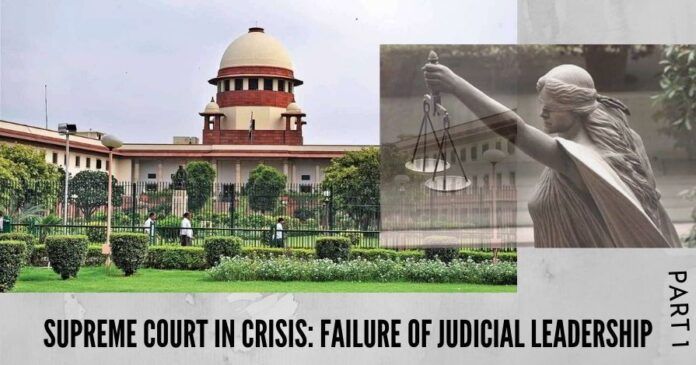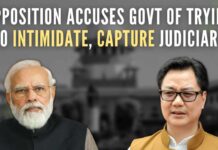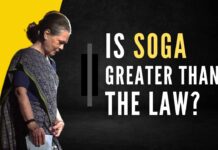
There is an urgent need of a public audit of human resource hiring and management in the Supreme Court and the high courts.
The two allegations to its integrity and credibility being faced by the Supreme Court today—— sexual harassment of a registry employee by the Chief Justice of India and cash for judgment through bench fixing—– demand an institutional change in its functioning.
The first change is freedom from fear for the practising advocate and the approximately 1000 registry employees. The second change is the public accountability of the judges who today constitute the nation’s most secured citizens—- physically, monetarily and medically— from appointment till death.
The promise of an alternative legal business market offering equal opportunity in the practice of law to the honest advocate, on record or otherwise, is wasted by supreme judicial neglect.
Advocates
The Supreme Court today presides over a licence raj created by itself. While the country has moved from licence raj to regulation and participative regulation, the Supreme Court licences advocates on record to give them a monopoly of doing all work in the registry and appearing for a client. This monopoly is extended by giving the advocate on record a super priority in the allocation of chambers around the court. The other is the licensing of senior advocates. Once licensed these advocates are like our elected politicians —– little or no public accountability for what they do after being licensed or elected. The Supreme Court is not concerned as to how some of these advocates get clients for their legal business in the court or how the legal business market is shaped by them to build powerful political, economic and other empires to create clout in the court. The idea of giving guaranteed results in cases by opening channels to judges, by attempting to tend to their desires that become needs and then wants, is generated from this business market. A whole parallel market of seminars, conferences, lectures —— domestic and international— is created to multiply this business. The judiciary becomes necessarily split between judges who get the benefit of this and those who do not. It is therefore entirely in the hands of the judiciary to encourage such a legal business market or to check it. This has given rise ultimately to the political lawyer striding confidently across this Supreme Court stage. The majority of lawyers who are not advocates on record, join the competition for legal business in such a market. The successful among these create a submarket of signing advocates on record since under the licensing rules of the Supreme Court made by the judges, only an advocate on record can file papers for a client in the court’s registry. Despite judgments by Justice Raveendran decrying the practice of signing advocates on record, the practice goes on and flourishes. Another subset market that has arisen consequently is that of the drafting industry which prepares complete Special Leave Petitions(appeals from high court judgments) overnight. The maximum business at the Supreme Court being of Special Leave Petitions, and not writ petitions for enforcing fundamental rights, the drafting industry flourishes. Most Special Leave Petitions are thrown out or dismissed by the Supreme Court every Monday and Friday. Yet, even while complaining of arrears, this phenomena of dismissal have not been publicly analysed by the Supreme Court for finding remedies to save valuable national judicial time funded by Parliament. Correcting this is entirely in the hands of the Supreme Court.
The consequence of inaction by the Supreme Court over the last seventy years is manifold. It has given rise to a class of pure legal business lawyers interested only in capturing clients for themselves or their law firm, with close connectivity to the travel, hotel and hospitality industry to take care of desires, needs and wants in India and abroad. The senior advocates, especially with a dollar or equivalent fees, can be hired for settling drafts, arguing and where necessary for offering draft orders for an amicable resolution of a dispute. The legal business specialist has a choice in deploying seniors having various kinds of clout. The upshot is that management rather than legal learning becomes relevant because, without a client from such a legal business market, the lawyer is nowhere.
In this political economy of legal business for a livelihood through the practice of law, the pressure to be a government counsel mounts, since this is the gateway to a possible judgeship in the high courts. The judgeship is an escape from this system if a lawyer becomes a judge without paying the costs of having been in this political economy of legal business. The temptation for such government counsel to the aspirational lifestyle of the private legal business market gets incentivized. Wholly unethical and illegal practices creep in and are well known to those dealing with money recoveries, land acquisitions, bails, infrastructure, corporate deals, arbitrations and insolvencies or bankruptcies. Those who become judges know about this first hand, one way or the other, and yet choose not to speak about this even as an analytical problem seriously infecting the judicial system. The Supreme Court today has a national judicial data grid covering high courts and district courts on arrears, but none whatsoever on the kind of practice and clients of lawyers being considered for judgeship in high courts and the apex court even though these lawyers criss- cross districts, States and continents for legal business to negotiate commissions and fees in cash, kind and formal recorded channels. A little known but outstanding example is of lawyers of religious institutions, trusts and the commodities markets floating on a sea of cash. It is rare to find a lawyer saying like the late R.K.P.Shankardass that the best tax planning is to pay the tax.
Another unfortunate effect is on the publicly funded and entirely judicially controlled legal services for the poor. This should have been the supreme focus of the Supreme Court to keep its work in consonance with the intention of the Constitution of India—– writ jurisdiction in the service of the poorest and those suffering from “undeserved want”. But it took the Supreme Court Legal Services Committee and its higher policy body under the Chief Justice of India, more than a decade to even recognise the existence of schemes for the poor launched and funded by the Union Government in the 1970s. Parliament funded legal aid has effectively been deflected to the legal business of the middle class like facilitating payment of utility bills and huge marketed events like traffic challans and insurance claims Lok Adalats. Any practising conscientious lawyer will point out as to what has happened to the alternative dispute resolution process of arbitration, mediation and conciliation. Ideas of working with the Constitution of India, which this Legal Services programme should have come up with, like Direct Benefit Transfer, health care, education, have consequently originated from the political executive in the last five years without any legal aid plan to monitor these or take national care of undertrials. The promise of an alternative legal business market offering equal opportunity in the practice of law to the honest advocate, on record or otherwise, is wasted by supreme judicial neglect. This is especially so since the legal profession is the most organized economic body from tehsil to the State and national capitals. The Supreme Court seems to have no interest in having a national grid of legal aid business lawyers and incentivizing such lawyers.
The honest judge and lawyer in the Supreme Court must continue to suffer for the judicial leadership failure in dealing with the macrostructure of legal business and the micro doings of some of their own judicial colleagues.
The Plight
Advocates practising in the Supreme Court are caught in a crisis of conscience between what they compulsorily are made to learn about ethics and the legal business markets created in the court, with no action by the court at any level to deal with this phenomenon which distorts the entire judicial system. The honest advocate —– one who does not run after clients, gives honest advice at the cost of not earning any more from a client, lives in reasonable fulfillment of needs, checks the desire for multiple properties and cars of higher and higher grades and has a place in his heart for unnecessary suffering and want— today finds life not only difficult in the Supreme Court but also becomes a distinct butt of non recognition by judges if not of ridicule. There is fear in the relationship between the mass of advocates and judges. If Supreme Court judges and especially the Chief Justice of India were to build a constructive relationship with the advocates on record they would not be today searching for answers to cash for judgment and bench fixing allegations. Advocates on record and the richest class of senior advocates are the repositories of the actual working of the court and the judges. Their lips are sealed due to the judicial environment of fear aggravated by the complete lack of accountability and the blockade on information about judicial activities. We are yet to see a movement of judges walking up to meet the advocates on record or other advocates to discuss the legal business markets, remedies for turning the court into a writ court for the poor, how to ensure the “enforcement’’ of its public interest declarations or how to devise an incentivizing scheme for legal services advocates ,organize subject wise study or expertise in the bar and think out tax incentive schemes for the scholarly or the legal services advocates. Is it surprising then that the first question that is usually asked in the Supreme Court by practising advocates is “Before which bench is the case?” The honest judge and lawyer in the Supreme Court must continue to suffer for the judicial leadership failure in dealing with the macrostructure of legal business and the micro doings of some of their own judicial colleagues.
to be continued…











Lawyers are liars! More so in India! The most unaccountable profession too!
It was said that due to demonetization 87 people died standing in long queues for few days in the country. How about legal tangos crying for justice for many decades and nearly 3 crores pending cases and how many people passed away without getting due justice? Justice delayed is justice denied. Service motto has gone out of the windows ever since late Indira became PM.
Those were the days, honest lawyers used to quote good things copied from memoirs also. It is missing for over three decades. Laws are misinterpreted to suit his/her political masters. Henceforth, one should not call senior legal professionals as legal luminaries! Taxpayers should not be over taxed.
An impression has been given by the judiciary in the country that, all levels of Courts are existing to serve and hush up Nehru-Gandhi dynasty and their coterie corrupt practices and mega scams for 70 years now. Judicial eco system is rotten to the core (like an apple) beyond repair.
Judicial reforms are a must. Proverbial three Ws – wealth, wine and woman starts from this profession coupled with media planting stories! Bar Council seems to be another municipal office. No ethics at all !
Provoked and badly motivated PILs are admitted in a jiffy. Bails and Stays are given and extended just like street corner pot poorie /gol gappas/Vada pavs/pizzas/hamburgers in criminals hands!
Latest case is fifth to seventh phase polling should start at 5 am or not……..due to a festival season……why judiciary is not allowing another statutory agency CEC to “finish” elections as scheduled and announced a month ago? Sabarimala and Ayodhya imbroglios showcases how laws are twisted or case is driven as per the wishes of Sibal/Chidambaram/Nehru-Gandhi dynasty.
Why we need more judges appointments when there is no quality in verdicts? Collegium is has become a messy affair. Why we need Law colleges when there is no quality and respect for the indian constitution? SC / HC corridors are filled with strong footprints of Sibal, Singhvi, Chidambaram, Bhushans et al only?
Advocates do not settle cases when it comes to family matter or divorce cases; I heard they bring down maintenance/compensation amount due to a suffering girl. Injustice is done across the table less said the better about final judgment after many decades!! While changing advocates, the right to throw out the bad advocate unknowingly hired his/her service should vest with the suffering party instead of begging for NOCs from his/her existing advocate for a change in advocate with immediate effect.
In our country common man does not understand intricacies involved. If caste politics are set aside Village panchayat seem to be better. Unfortunately to settle political scores, four senior SC judges sat on a dharna and spoke with the media spilling the beans! Their appearance on streets showed some bartering of so many key/high profile pending cases!! In fact, Congress-I , since 2014 used SC/HC as a playground to fix and frame BJP lead govt and SC/HC intended to usurping executive/ admin seats of powers and nearly intended to start governing the country itself! In such a scenario, where democratically elected in the people’s court PM and his ministries should go?
Through PGURUS, I request President of India to allow case hearings in all unused indoor and outdoor stadiums in the country as open courts to settle cases by using Legal Process Outsourcing Software Companies (ITeS) in the country with or without giving tax breaks to such software companies and help generating employment in every State and UTs for at least few years.In this way the nation can get rid-off rotten people having decayed mindsets.
In our country “Legal Robots” (!!) must be imported and deployed if any, available on the globe and must be used so as to enable avoiding people like Sibal, Singhvi, Chidambaram, Bhushans et al influencing Judges and to get unbiased verdicts and send crooks behind the bars at the earliest!!
These ugly guys are getting away with everything even after at the stroke of a midnight.
“Legal Robots” debars and sends out winking of eyes /dress code misused with ease by senior advocates/Congress-I advocates in the country!
SATYAMEVA JAYATE MUST RETURN.HOPE PLANET JUPITER MAY HELP!!SOONER THE BETTER.
The SC / HC and all courts of this country needs to be cleaned up. The Judges sitting in these courts are stooges of Congress who has appointed them SC pulls all govt departments , but it has no shame when the cases are pending for 50 Years . It has no shame when incompetent judges are appointed. When Kashmir Pundits were destroyed and thrown out SC kept Quite. WHen Sikhs wher murdered by Congress Leaders SC kept quite. If ther is a lyching of 1 Muslim in 1 corner of Rajasthan the SC will send notice to BJP Govt. Removal all Judges in 1 GO . Remove all their perks. Appoint Military personnel as Judges. I Guarntee within 2 Years all cases will be solved. NO BAIL , NO VAIDHA, NO supporting Criminals and criminal lawyers . Evey Month The jUdges will give Report in Public Domain of the cases Cleared . They are getting salary from teh TAX PAYERS . Let them be in RTI
so my take away is – 2 factions- political leanings by justices- what is the ratio of appointed justices currently on the SC bench-? leaning to BJP vs congress/opposition?
the SC structure- justices followed by SC appointed/licensed/practitioner lawyers- also politically leaning BJP vs opposition- so
next layer- first line lawyer- practicing in/around the SC ecosystem- also has political leanings- BJP vs opposition
inbweteen the first lawyer and SC practicing lawyer- you have the employees at the SC- administration, bureaucrats – prone to corruption likely- they have influence/ears of the food chain.
imagine – I am Subramaniam Swamy- bringing a private petition at the SC – begin the process- find a SC practitioner in the SC eco system.
my take away- corruption- at SC practitioner level- and at the bureaucrat level- so the justice bench level- each justice/justices has a courtroom assigned- so imagine Swamy- would ideally like to be before a BJP leaning justice/justices- so he would be dealing the that part of the food chain.
so if the SC practitioner ecosystem together with the bureaucrat ecosystem can cause disruption to remove a justice or outcome of a hearing?
the other level of corruption- assigning hearings to which justices/courtroom ?
how am I doing?
like it or not- deep political preferences and the food chain- has taken hold of the system- in the previous immediate UPA- understood how they could influence court hearing outcomes- and the infrastructure is noe embeded in the SC eco system in general.
the challenge for the chief justice- remove poilitical and money iinfluence in the SC count.
politics and money has embeded into the daily transactions- at the SC lpractitioner and bureaucrat levels-
so how would you go about removing those 2 influences?
If even a common man can sense that judiciary is biased , then the judges have definitely failed.
Sabarimala verdict – a thoughtless verdict by judges who don’t know the customs prevalent in the Southern most part and who didn’t even work (no home work done) out a proper reading of the sensitive issue and even after lakhs of people protested was not willing to review the judgement reflects poor standard of the judges…
Sai Pradeep did give his best points but biased judges listen only to the influential advocates …
They are kings for sure now but will burn in hell without fail.
Suuuuuuuuuuuuuuuuuuuuuuuuuuuuuuuuuuuuuuuuuuuuuuuuuuuuuuuuuuuuuuuuuuuuuu per article !!!!!!!!!!!!!!!!!!!!!!!!!!!!!!!!!!!!!!! Dr Krishna Mahajan, I have been crying about this in slilence and with my few close friends, IMMEDIATE ADVOCATING JUDICIAL REFORMS, EVEN BEFORE DEALING WITH TERRORISTS !!!!!!!!!!!!!!!!!!!!!!!!!!!!!!!!!!!!!! But no one to hear my voice, because I am too insignificant and unknown person. I always lament about our judiciary when comparing it with the ones in other countries like Singapore and even Indonesia, which is far far logical and meaningful – definitely not millions of cases pending, definitely NO VACATIONS FOR COURT AND JUDGES !!!!!!!!!!!
Sir, this article is suuuuuuper article and I would request you continue your fight for JUDICIAL REFORM in INDIA – a HARD SURGICAL STRIKE on Judiciary, is what is the need of the hour.
Beautiful article, thought provoking. This gentlemen, Dr.Krishna Mahajan should become active over Twitter.